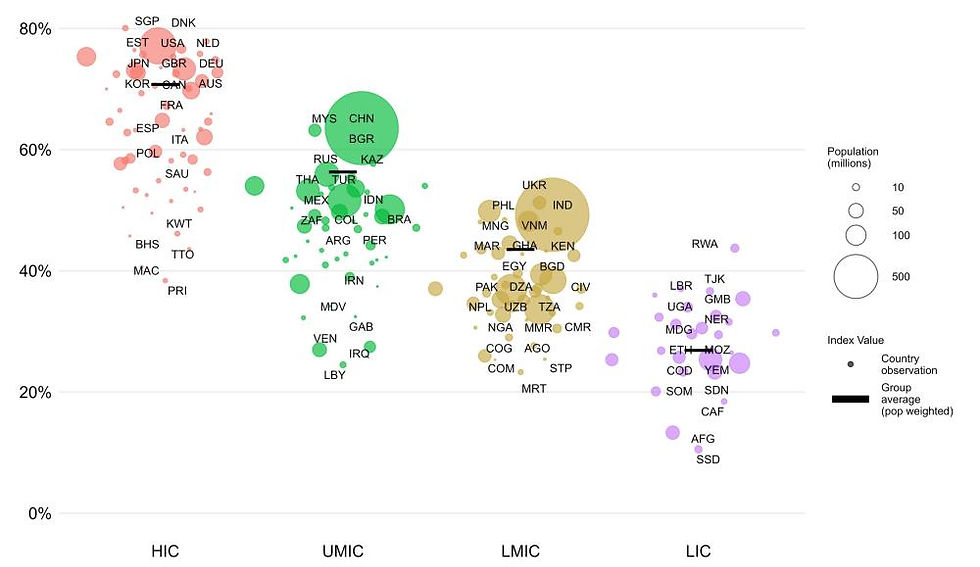AI Won’t Fix Inequality—But Inclusive Innovation Culture Can
- micjak77
- Aug 6, 2025
- 3 min read

Artificial Intelligence (AI) is often hailed as the “great equaliser” of our time—a force capable of transforming economies, accelerating productivity, and rewriting the future of work.
But here’s the uncomfortable truth: AI could also become the great divider.
Left unchecked, AI risks concentrating wealth and opportunity in a handful of countries, companies, and communities. It could automate away jobs faster than new ones emerge. It could push developing nations further behind.
The real question is not whether AI will change the world—it’s who will benefit from it. And the answer depends on one critical factor: whether we build an inclusive innovation culture that empowers everyone to participate in shaping the AI-powered future.
The Inequality Risk No One Can Afford to Ignore
We’ve seen this story before. The Industrial Revolution and the ICT boom created enormous prosperity—but that prosperity was unevenly distributed.
AI risks repeating this pattern:
Within countries → High-skilled workers thrive while lower-skilled roles get automated.
Between nations → Countries with digital infrastructure and AI talent surge ahead while the rest struggle to keep pace. Figure 1. AI Preparedness Index by Country Income Group, 2024

Note: Acronyms: high (HIC), upper-middle (UMIC), lower-middle (LMIC) and low (LIC) income countries. Countries with labels are those with a population over 25 million or those who are in the top or bottom five of each income group.
Consider this: In 2023, the U.S. attracted $67.2 billion in AI investments—8x more than China and exponentially higher than most developing nations combined. Meanwhile, internet access in low-income countries lags at just 27%, and broadband costs eat up as much as 31% of monthly income in some regions.
If we continue down this path, AI won’t just transform the world—it will fracture it.
Why Inclusive Innovation Culture Changes Everything
Here’s the good news: inequality in the AI era is not inevitable. It’s a design problem. The solution lies in building an inclusive innovation culture—a way of working, learning, and creating that democratises access to technology and turns AI into a tool for shared prosperity.
Democratizing AI Capabilities
When innovation skills, tools, and resources are accessible to all—not just elite teams—AI stops being an exclusive advantage. Grassroots innovation programs, AI literacy for non-technical talent, and affordable access to digital infrastructure can enable every community to participate in the AI economy.
Creating Adaptive Workforces
AI isn’t just eliminating jobs—it’s reshaping them. By embedding innovation thinking into education and workforce development, we can prepare workers to pivot, reskill, and co-create solutions. This transforms AI from a threat into a career accelerator.
Fueling Locally Relevant Solutions
Innovation is most powerful when it’s contextual. From AI-driven precision farming for smallholder farmers to low-cost AI healthcare diagnostics in rural clinics, an inclusive innovation culture ensures that technology solves the problems that matter most—wherever they may be.
The Playbook for Closing the Gap
To ensure AI narrows, not widens, the global divide, we must go beyond policy papers and infrastructure plans. We need a cultural shift:
Embed Innovation in Education → Move beyond STEM and integrate creativity, problem-solving, and AI literacy across every level of learning.
Build Global Innovation Coalitions → Enable knowledge-sharing between developed and developing nations, ensuring no one innovates in isolation.
Redesign Corporate Innovation → Shift from siloed R&D to company-wide innovation pipelines that engage every employee, not just “the tech team.”
Support Local Innovators → Fund, train, and enable entrepreneurs solving region-specific challenges with AI.
AI as a Force for Shared Prosperity
AI doesn’t have to deepen inequality. If we build inclusive innovation cultures in our organisations, our communities, and across nations, AI can become the great equaliser it was promised to be.
The future of AI won’t just be determined by algorithms. It will be determined by culture—whether we choose to make innovation the privilege of a few or the power of the many.
The choice is ours. The time is now.
At Incluvate, we believe innovation should be a shared language, not a luxury. If you’re ready to build an inclusive innovation culture in your organisation, let’s start the conversation.
Talk to Us | Because the future of AI should belong to everyone.

Comments